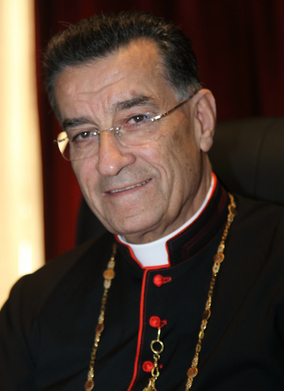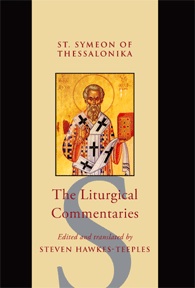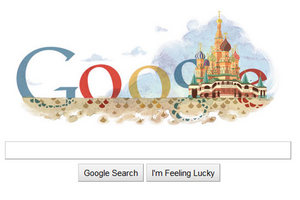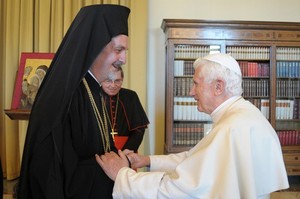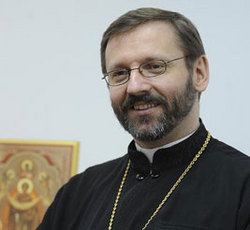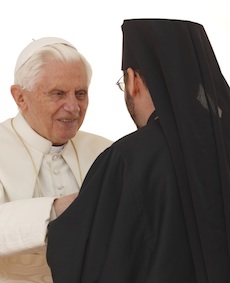News seems to be made about a Catholic married clergy in the USA, at least among the Eastern churches. It’s not new news but it is an interesting development in the USA that needs insight and pastoral action. The new bishop of the Melkite Church in the USA, Bishop Nicholas Samra (btw the first American born leader of the eparchy), spoke of the need of having a properly formed clergy to pastor the 27,000+ souls of the Melkite Church in the USA, even ordaining married men. In the coming year there may be one celibate man ordained.
Category: Eastern Church
Maronite Bishop admonishes Obama for rebuff of Patriarch Béshara Raï
Patriarch
Béshara Raï, 71, is making a pastoral visit to the Maronite Catholic
communities in both US eparchies from 4 to 23 October 2011. His Beatitude will visit Eparchy of Our Lady of Lebanon and the Eparchy of St Maron of Brooklyn.
President Barack Obama has roundly refused to meet the Patriarch. Bishop Gregory openly makes the case that it is a mistake of the current administration to ignore His Beatitude’s visit to the USA.
Béshara Raï, was elected on March 15, 2011 as the 77th Patriarch of the Maronite Church.
Bishop Gregory’s letter:
September 30, 2011
Dear Mr. President:
I am terribly
disappointed with the rebuff of Patriarch Bechara Peter Rai who is the Catholic
leader of the Maronites worldwide and one of the most respected Christian
leaders in Lebanon and the Middle East . The motto of his coat of arms
reflects his personality and is call for “communion and love.” He has been
trying to achieve what no other Middle Eastern political or a religious leader
has been able to do: meet others with respect and love, not take sides,
and build bridges to a future that will hopefully lead to peace and happiness
for all people in the Middle East.
Muslim and Christian groups have all found
in him a real father, a Patriarch. Because he has spoken out expressing
his concern for the future of Christians in the Middle East , he has been
rebuffed by you and your Administration. It is pure hypocrisy for the
leader of the free world to refuse to meet with Patriarch Rai especially since
the Prime Minister of Israel can come and completely disregard essential parts
of a peace plan and still be given a warm welcome, and the King of Saudi
Arabia, where Christians have no freedom whatsoever, can be received with highest
honors. Mr. President, you are ignoring the plight of Christians in the Middle
East!
Patriarch Rai’s warning about the future of Christians in Syria is not
taboo. Christians are in a state of peril in the same way that Christians of
Iraq were a few years ago when two thirds of them migrated out of the country
and are still not protected to this day. To say the Patriarch supports
dictators and sides with terrorists is pure nonsense. With his own unique
charisma, Patriarch Rai has reached out to all Lebanese with whom he has to
live side-by-side. It is a beautiful outreach, one that is uniquely his,
without having to be beholden to anyone. He speaks with love and tempers
the divisive, hateful talk of many. He gives hope
A new day is dawning in the
Middle East. The Arab Spring is happening with little vision for the
summer that will ensue. Mr. President, you do not have to agree on
everything with Patriarch Rai, but there is no need to avoid or rebuff
him. By doing so, you are showing your disrespect for him and for all
Christians of the Middle East.
Bishop of the Eparchy of
Saint Maron of Brooklyn
Archbishop Dmitri reposes
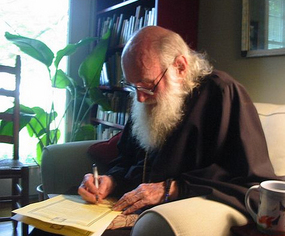 Very early this morning, Archbishop Dmitri, 87, emeritus archbishop of Dallas and the Diocese of the South, died after failing health.
Very early this morning, Archbishop Dmitri, 87, emeritus archbishop of Dallas and the Diocese of the South, died after failing health.
The Liturgical Commentaries of St Symeon of Thessalonika
I am happy to recommend my friend’s recently published book, The Liturgical Commentaries of St Symeon of Thessalonika.
From the book:
This volume contains an edition and facing
English translation of Explanation of the Divine Temple and “On the Sacred
Liturgy,” the two commentaries on the pontifical (hierarchal) Byzantine Divine
Liturgy by St. Symeon of Thessalonika (†1429). This edition is based on MS
Zagora 23, which contains extensive corrections and additions apparently added
to the text by the author himself. The book opens with a historical and
theological foreword on liturgical commentaries and mystagogy by Archimandrite
Robert Taft. The introduction surveys the life and career of St. Symeon,
analyzes the structure and theology of the commentaries, and concludes with an
account of technical and editorial questions. The index includes references to
names, places, and topics in Symeon’s text and in the introduction and traces
key terms in the commentaries in both Greek and English.
A review:
With this book Fr.
Steven Hawkes-Teeples, SJ, Professor of Byzantine Liturgy at the Pontifical
Oriental Institute in Rome, fills a gaping hole in the scholarly literature
associated with the overlapping academic fields of Byzantine Studies, Medieval
Studies, Orthodox Theology, and Oriental Liturgiology. The present volume
represents the first translation into any modern western academic language of
both commentaries of St. Symeon of Thessalonika (d. 1429) on the Byzantine
Divine Liturgy or Eucharist. Such neglect is surprising, for St. Symeon is an
author of the first importance. As the last and most prolific Orthodox
liturgical theologian of the Byzantine era, who lived at the point when the
Byzantine Empire was moving toward its demise before the Ottoman onslaught, he
crowns and closes his era. — Robert F. Taft
St Basil’s Cathedral at 450
Reciprocal festal gestures for Sts Peter & Paul feast: Pope and an Ecumenical delegation meet
It’s like having your favorite but not too seen aunt Gretchen over the house for coffee to remember what she looks like and to keep up some appearances of genuine love. I shouldn’t make light of such encounters; they are important. It’s tradition and tradition is a very good thing. On the feast of Saints Peter and Paul a delegation is sent to Rome to meet the Pope, to exchange fraternal greetings, to listen to a brief discourse that’s on the mind of the Pope, to hear what the Patriarch of Constantinople has to say, etc. The whole thing is repeated on November 30 when Rome sends a delegation to Constantinople for the feast of Saint Andrew. The trouble is, does anything concrete result from these yearly meetings? What are the implications of this type of high level meeting? Note the Pope’s perspective and his hope. There is an important rhythm of dialogue that happens in coming to understand human and ecclesial complexities which have an end in mind. Two of the Pope’s paragraphs are noted below.
The Orthodox delegation included: His Eminence, Emmanuel, metropolitan of France and Director of the Office of the Orthodox Church to the European Union, Bishop Athenagoras, Bishop of Sinope and auxiliary to the metropolitan of Belgium and Archimandrite Maximus Pothos, vicar general of the metropolitan of Switerland.
Watch the video report from H2O News.
We follow with great attention the work of the Mixed Commission for Theological Dialogue between the Catholic Church and the Orthodox Church as a whole. From a purely human point of view, one might have the impression that the theological dialogue is having trouble in progressing. In reality, the rhythm of dialogue is linked to the complexity of the themes being discussed, which call for an extraordinary effort of study, of reflection and of reciprocal openness. We are called to continue this course together in charity, invoking light and inspiration from the Holy Spirit, in the certainty that He wishes to lead us to the full accomplishment of the will of Christ: that they may all be one (John 17:21). I am particularly grateful to all the members of the Mixed Commission and in particular to the co-Presidents, His Eminence the Metropolitan of Pergamum Ioannis and His Eminence Cardinal Kurt Koch, for their tireless dedication, their patience and their competence.
Nicholas James Samra: New eparch of Newton for the Melkites
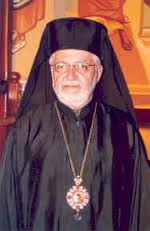 The Holy Father, upon the recommendation of the Melkite Synod, has given his assent to election of the Most Reverend Nicholas James Samra as the new Eparch of Newton for the Melkites. Bishop Nicholas, 67, has been the auxiliary of the same. Bishop Nicholas replaces Archbishop Cyril Salim Bustros who has been elected the Metropolitan of Beruit and Jbeil.
The Holy Father, upon the recommendation of the Melkite Synod, has given his assent to election of the Most Reverend Nicholas James Samra as the new Eparch of Newton for the Melkites. Bishop Nicholas, 67, has been the auxiliary of the same. Bishop Nicholas replaces Archbishop Cyril Salim Bustros who has been elected the Metropolitan of Beruit and Jbeil.
Archbishop Shevchuk interviewed by Vatican Radio
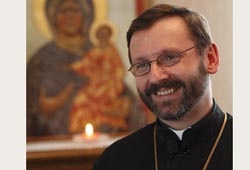 Archbishop Sviatoslav Shevchuk was recently interviewed by Philippa Hitchens of Vatican Radio.
Archbishop Sviatoslav Shevchuk was recently interviewed by Philippa Hitchens of Vatican Radio.
Sviatsolav wants fraternal realtions with Patriarch Kyril
His Beatitude Sviatsolav is making headlines these days with all kinds of hott button issues. The news is reporting, predictably, that His Beatitude wants to work on relations with the Russian Orthodox Church. No doubt his own predictions for dialogue leading to deeper full, visible unity would indicate his desire to be fraternal with the ROC and one may also say that he’s taking note of Pope Benedict’s desire to meet with Patriarch Kyril.
Sviatsolav said: “Our church has voiced its readiness and openness for a dialogue ever since it emerged from the underground.” And he’s also reported to have said, “I think that today, we should heal the wounds rather than irritate and deepen them. One can heal the wounds of our memory only with mutual forgiveness. Therefore, as for any our brethren or neighbors who wounded us or were wounded by us, the best way to communicate is to be open in a brotherly dialogue, be open to the purification of our memory, to ask for forgiveness and to forgive.”
Shevchuk talks about his election, chosen to lead a Church
Cindy Wooden’s CNS article, “Ukrainian archbishop says he was chosen ‘despite age to promote unity” on Archbishop Sviatoslav Shevchuk gives a clearer sense of the man and some of priorities. Wooden and Shevchuk met in Rome this week on the latter’s visit to Pope Benedict.
- to strengthen the proclamation of the Gospel (kērgma) and the teaching of the faith (didachē)
- to work on the Church’s liturgical theology and praxis; to make the liturgical patrimony intelligible in all the countries where the Ukrainian Catholic Church exists
- to develop programs that attack secularism and engages the positive secularity
- to strengthen the service of justice (diakonia)
- to promote unity in the Church and among the other churches
- to develop better social communications strategies for the Church
- to identify ways in which to inculturate the Gospel and Byzantine tradition
- to work with the Ukrainian people to heal from past injuries viz. the Russian Orthodox Church; to work on the fears that are paralyzing some members of the Church
- to dialogue and work with the Orthodox Churches in the Ukraine (and where the Church is present) on matters of theology and mutual human interest
- to promote healthy celibate and married vocations to religious life and priesthood.

